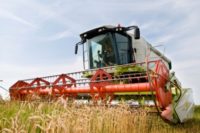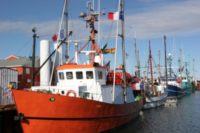NIOSH ag, forestry and fishing research gets a high grade from review panel

 An expert panel has awarded NIOSH’s research program to prevent work-related injuries, illnesses, and deaths in the agriculture, forestry, and fishing Sector the highest rating – a five on a scale of 1-5 – based on its relevance.
An expert panel has awarded NIOSH’s research program to prevent work-related injuries, illnesses, and deaths in the agriculture, forestry, and fishing Sector the highest rating – a five on a scale of 1-5 – based on its relevance.
“Research has been in very high priority areas and is highly relevant to improvements in workplace [safety and health] protection,” the report stated. It noted that NIOSH has engaged in activities to move its research into actual safety and health practice “on a very significant level.” Further, it cited “considerable progress” since 2007 in achieving intermediate outcomes, such as strengthening the engagement of stakeholder groups in the agricultural community, and developing strategic goals for injury and illness surveillance, research, education, and other critical needs.
The impact of the research program was rated 4 out of a possible score of 5, an increase over a score of 3 in the 2007 review. The report noted “much notable progress” since the previous review, in 2007, and pointed to advancements like “significant lowering of child death rates due to agricultural worksite risk,” diffusion of new technologies to prevent fatal tractor rollovers, and adoption of personal flotation devices and other protective measures in the commercial fishing industry.
“More progress needs to occur within the sector,” but such progress “awaits maturity” of current initiatives in the research program, and further translation of research into practice across worksites in the sector, and across populations at risk, the report said.
The review panel, which was convened and chaired by Dr. Paul D. Gunderson, director of the Dakota Precision Agriculture Center and former director of the National Farm Medicine Center, evaluated the current status of the Agriculture, Forestry, and Fishing (AgFF) Sector Program, which NIOSH conducts under partnerships with diverse stakeholders under the National Occupational Research Agenda (NORA). The review cited progress achieved by the program since an earlier review in 2007.
Dr. Gunderson’s report from the new review was submitted to NIOSH on June 26 and is available at www.cdc.gov/niosh/programs/agff/naseval.html .
The 2007 review was conducted by a similar panel of experts, also chaired by Dr. Gunderson, under the Board on Agriculture and Natural Resources of the National Research Council and the Institute of Medicine.
“The ensuing five years have seen implementation of the NORA [initiative] that was in place, but not yet fully deployed at the time of the initial review, internal adjustments within NIOSH that placed the AgFF Program under synergistic leadership, and significant change in both national public policy and scale of worksite adjustments,” Dr. Gunderson said in a cover letter to the report.
NIOSH Director John Howard, M.D. said the review will help NIOSH conduct strategic, results-driven research to protect the safety and health of those who work in this fundamental American industry sector.
The agriculture, forestry, and fishing Sector has the highest fatality rate of any U.S. industry sector. Under the NORA program, NIOSH has worked closely with industry organizations, farmers, agricultural workers and their representatives, state and federal agencies, educators, community groups, and other safety and health professionals to identify risk factors in the industry, to develop effective preventive measures, and to move those results into practice. More information on the Agriculture, Forestry, and Fishing Sector Program can be found at www.cdc.gov/niosh/programs/agff/, and more information about NIOSH research at www.cdc.gov/niosh/topics/agriculture/.
Looking for a reprint of this article?
From high-res PDFs to custom plaques, order your copy today!









